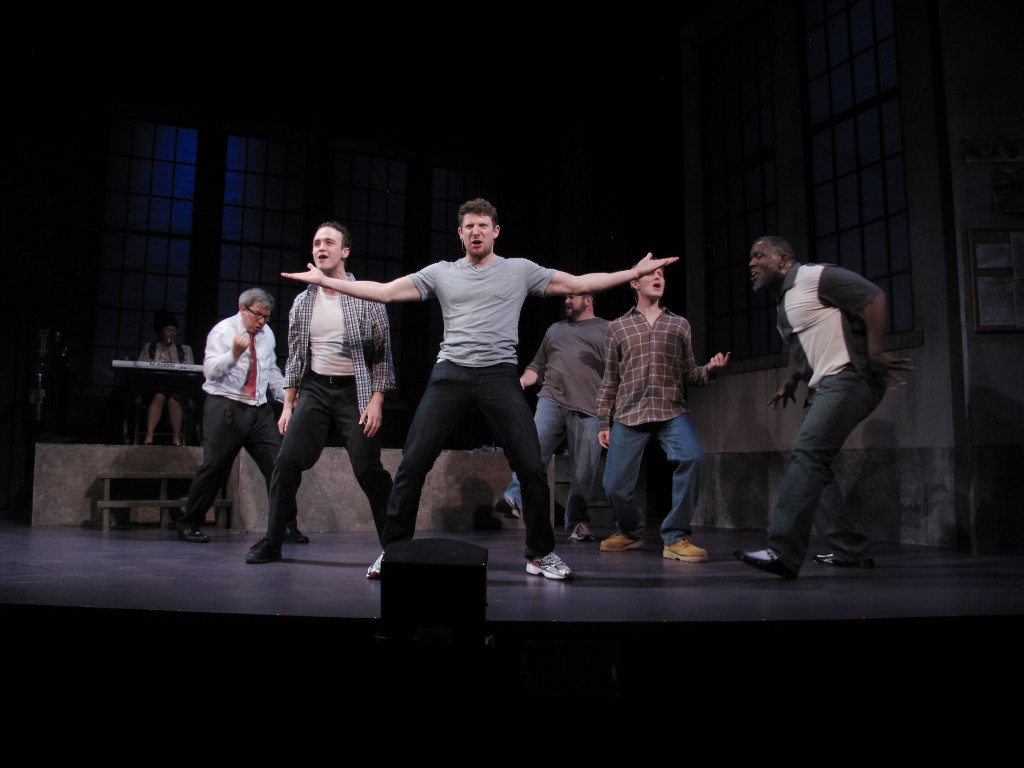
teve Gagliastro (as Harold Nichols), Nick Sulfaro (as Malcolm MacGregor), Michael Timothy Howell (as Jerry Lukowski), Corey Jackson (as Dave Bukatinsky), Andrew Oberstein (as Ethan Girard), David L. Jiles, Jr. (as Noah "Horse" T. Simmons); photo credit: Carla Donaghey
The Full Monty; book by Terrence McNally, lyrics by David Yazbek, Stoneham Theatre, 4/12/12-5/6/12, http://stonehamtheatre.org/.
Reviewed by Craig Idlebrook
(Boston, MA) I remember once going to see Gremlins 2 as a child and thinking immediately afterwards that it was just as good as the original. It had so much that was…fun! Yet after some thought, it dawned on me that it was like a terrible mashup of the original, and no critic in their right mind would have called it a good movie. Of course, now that I think of it, no critic in their right mind would probably think the original Gremlins was a great movie, so maybe I shouldn’t take this analogy any further.
The point is, and I do have one, that a show can wow an audience but still not hold up under critical scrutiny. And you can have fun at a show and then feel that good-time vibe wear off like a buzz after a wedding reception.
Stoneham Theatre’s production of The Full Monty is infectiously fun even before a cast-member treads the boards. The theatre is packed with mobs of women out for a high-brow version of low-brow fun, as the play is all about men finding their inner self-worth while shedding their clothes, sort of like a male version of the movie Showgirls, only with redeeming moral value, plot, three-dimensional characters and intentional humor.
But alas, despite what is advertised through some very fun songs, this show does not bring the goods. It is an uneven production that relies on charisma, a handful of quality scenes, some strong performances and an undulating wave of good vibes to get by. To make the stripping work at the end, we have to see these men transform and rediscover their pride, and the emotional arc just isn’t there. But even in this, the play feels more like a genial block party, an event that has little lasting meaning, but sure is fun to attend at the time.
The premise of the play is dated, but it works. Men involved in manufacturing in Buffalo finding themselves laid off and refusing to get service jobs because it would somehow hurt their pride seems a bit far-fetched in the “You-Gotta-Be-Flexible” post-meltdown economy, but it’s easy enough to swallow. Hey, we all get stuck in strange places when it comes to self-identity. Also dated a bit is the central driving force of the mean mom keeping the kid away from the father unless he gets a job and pays back his child support, but it worked better in the nineties when the movie came out.
The central problem is that the performances often are uneven and director Caitlin Lowans fails to build the relationships needed to bind us to the characters. At times, the actors just feel uncomfortable, even in their final stripping sequence, when they suddenly are supposed to turn from bumblers to Mac Daddies.
There’s a fundamental miss in the central character of Jerry Lukowski (Michael Timothy Howell). First, allow me to be shallow here, but if the idea is that these men are supposed to be sexy even without perfect body-types, it would help if this sad sack of a loser-central character didn’t have forearms that could crush you like a bag of potato chips and a six-pack to bounce a quarter off of. Howell has charisma to spare and is so enjoyable to watch, but he needs to have the confidence to save it and make sure the audience sees Jerry’s congeniality as bravado until the
big payoff.
With many of the other characters, the cast can’t seem to get into the groove of making them over-the-top or grounded and believable. The exception is David L. Jiles Jr.’s rendering of Horse; he was the one actor in the cast that I never had to worry about seeing the strings attached. Even though Horse is given no movie-of-the-week background drama to work with, we can glimpse into his life from childhood with every nuanced move on stage.
Two actors who shoot for over-the-top and score are the senior piano player, Jeanette Burmeister (Margaret Ann Brady) and the mama’s boy of Malcom McGregor (Nick Sulfaro). Both actors go to the hilt to make some show-stopping stage-time for their characters, even if you have to wonder what planet those characters came from afterwards.
The set does a very strong job mimicking post-industrial Buffalo, and only
fails when a conversation takes place in what is assumed to be a more affluent neighborhood. The songs resonate, but fade shortly after the production is over, as many of its memorable dissonant harmonies seemed a bit out of the comfort-zone of the singers.
But you know what? Despite the above paragraphs, the bottom line is that I had fun. And that has to count for something, even if it leaves you feeling a bit empty and tired at the end of the night.
